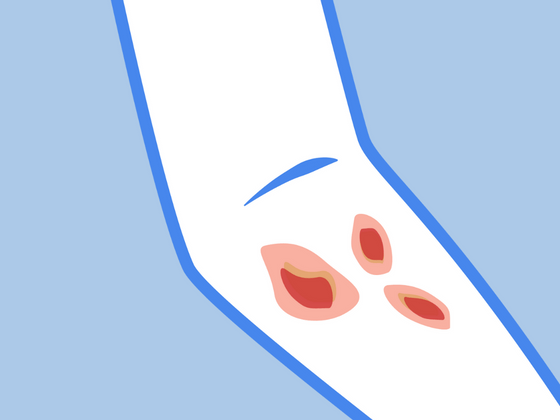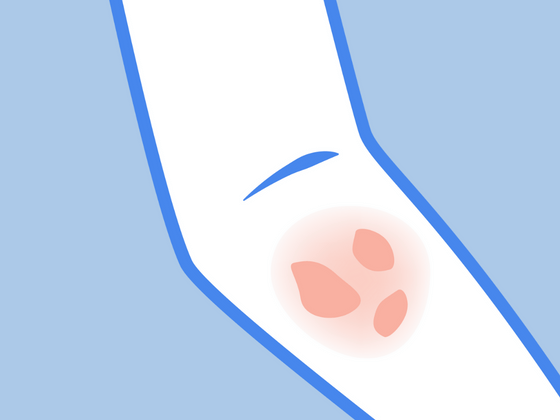Do you experience chapped lips over the winter months? Or dry, itchy skin on your hands as the temperatures plummet?
If you're impacted by dry winter skin, you're not alone. Winter itch is very common during cold weather due to a drop in humidity, harsh weather, and dry indoor heat.
Throughout this blog, we'll cover everything you need to know about:
-
The causes of dry skin over the winter months
-
Symptoms of dry skin
-
Best natural treatment methods for nourishing and relieving dry skin
While keeping our skin healthy over the colder months often requires more tender love and care, winter dry skin doesn't have to be inevitable.
Read on to learn more about combatting dry skin today and achieving healthy skin no matter the season.
Causes of Dry Skin In Winter
Our skin barrier (or stratum corneum) predominantly comprises of natural oils - called lipids - and dead skin cells. This outermost layer protects your body from harmful allergens, irritants, and toxins.
During harsh weather, however, cold air and biting winds strip your skin of its vital natural oils. At the same time, indoor heating reduces humidity, limiting the amount of moisture in the air available for your skin's absorption.
Over time, these conditions can damage your skin's barrier, making it harder for your skin to absorb and retain moisture. This causes symptoms ranging from mild itching and sensitivity to severely dry skin.
Further Risks To Skin Health
While most people will likely experience some form of irritated skin over the winter, a few factors may exasperate your symptoms.
Atopic Dermatitis
Atopic dermatitis is a chronic skin condition characterized by dry, itchy skin patches that repeatedly 'flare' up.
For people with eczema, these flare-ups will be triggered by various genetic and environmental factors. For example, during the winter months, you are expected to experience drastic changes in temperature as you hurry inside from the bitter cold into the coziness of indoor heating. If you have susceptible skin, these sudden changes can irritate the skin's barrier and lead to an eczema flare.
Hot Showers
There's nothing better than a hot bath or a shower when it's cold outside. But did you know that exposure to hot water for long periods can damage your skin's barrier significantly?
Many harsh soaps, exfoliating scrubs, and body washes tend to be packed full of artificial chemicals, which is why choosing the right eczema soap is important, too, which may wreak havoc with your skin biome and strip your skin's natural oils.
Dry Skin Symptoms
Dry skin will manifest differently for every individual, mainly depending on your age, gender, ethnicity, and other determining factors such as your mental health and stress levels.
This being said, however, there are a few common symptoms to look out for:
-
Skin sensitivity
-
Itchy skin
-
Flaking
-
Cracking and, in severe cases, bleeding
-
Skin roughness
-
Stinging or burning sensations
-
Redness or inflammation
Winter Skin Care Tips
Self-care is essential during the winter time. Perhaps you're worn down from the intensity of the festive period, or the dark, long nights are depleting your energy. If this sounds familiar, there's no better time to take extra care of yourself than these colder months, and your skincare routine might be the perfect place to start.
To avoid developing dry skin this winter, we've got a few tips to help you protect your skin:
Adjust Your Skin Care Regimen
To help restore your skin's barrier, look out for skin care products that contain nourishing ingredients, such as lauric acids or natural options like beef tallow cream (or hyaluronic acid), which help seal the spaces between your skin cells and retain moisture.
Rather than using harsh exfoliating creams or scrubs, we recommend finding gentle exfoliants that contain salicylic acid, which clears dead skin cells.
Winter Moisturizer
One of the best ways to combat dry skin during cold temperatures is to moisturize your skin regularly and generously with a nourishing emollient or eczema cream.
For example, this Super Dry Soother was formulated with scaly, dry eczema and psoriasis in mind. It was made for general moisturizing dry, rough hands and feet, overwashed, and winter skin. The herbs in this formula are traditionally used to promote circulation and accelerate healing, soothing even the most rough, cracked, and chapped skin.
Wet Wrapping
Suppose you're coping with severely dry skin. In that case, we'd recommend wet wrapping, which involves wrapping your skin's affected area with a damp fabric after moisturizing to help lock in extra hydration.
This wet wrap can then be covered with a dry top layer, such as your pajamas, allowing you to sleep overnight with the wrap to gain maximum benefits.
This Remedywear™ (TENCEL + Zinc) Sleeves/Bandages for Babies to Adults is the perfect wrap for this technique, made from antibacterial and anti-itch materials.
Hydrate Regularly
And finally, there's no better way to boost your skin's hydration than from the inside out. Ensure you're drinking plenty of water and eating foods with a high water content, such as fruit and vegetables.
If drinking cold water or juices feels like a struggle over the winter months, why not treat yourself to regular herbal teas instead?
Soothe Your Dry Skin This Winter
Follow these tips to help you better understand why your skin barrier seems to struggle over the winter months and how best to keep your skin healthy, nourished, and supple all year round.








